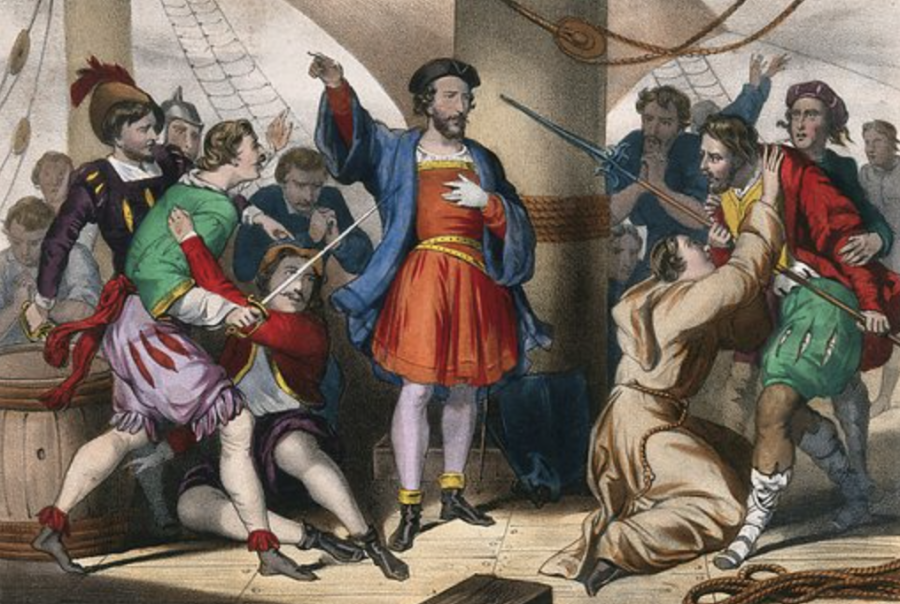Why we should celebrate Columbus Day
Christopher Columbus, now one of the most controversial figures in world history, still receives admiration for his expeditions
October 5, 2022
As we reach the beginning of October, America will soon take another year to remember Columbus Day. For the last few years, there has been much discussion on whether or not the country should continue to remember Columbus or change the holiday to honor some other various people. The answer is solely in the former; that while Columbus was not a perfect man by any means, he was a respectable man and his memory should continue to be honored in this country for generations to come.
Christopher Columbus was first commissioned by the Spanish crown to sail to the New World in 1492 by King Ferdinand II and Isabella I. He soon assembled a crew and began his journey to the New World, making landfall on the island of Hispaniola (modern-day Haiti and Dominican Republic) several months later. When he arrived at the island, he found that the island was already inhabited by a native tribe called the Tainos. After this encounter, the history begins to become complicated. Columbus had orders from the king and queen to treat the natives well and so he did at the beginning.
After Columbus returned to the island in 1493, he found that chaos between the natives and the Spaniards had ensued in his absence. He was soon joined by his brother Bartholomew in 1494, who was then appointed adelantado (senior governor) during Columbus’ absence. Columbus left the island again in 1496, and this when all pandemonium happened. Bartholomew, who had been left in charge of the island by his brother, was rebelled against by Francisco Roldan, the local governor of La Isabela. While the reasons for Roldan’s rebellion remain questionable, it was most likely due to the refusal to refloat a caravel at Isabela due to the ongoing war between the Spaniards and the natives. Roldan also charged Bartholomew with cruel treatment of the natives and Spaniards and attempted to overthrow him. When this failed, Roldan set up a competing regime on the other side of the island. Upon Christopher’s return in 1498, he reconciled the two regimes by granting Roldan’s request for his men’s control over native labor. While this was a more than injudicious decision on behalf of Columbus, it was clearly not done out of cruelty to the natives and more so, it was done to appease the very appetite of the man who had charged his brother’s regime with the same cruelty he now demanded.
After this disaster, the Spanish crown sent Francisco de Bobadilla to preside over the situation on the island. Bobadilla, upon meeting Christopher’s other brother, Giacomo, was told he did not have authority over Christopher on the island. He soon locked both Columbus brothers in jail, but they were soon acquitted. Even more telling, was that one of the principal charges against Christopher was that he had hanged five Spaniards since they had committed atrocities against the natives. This is a clear example that the charges against Columbus were not of his cruelty to the natives, but his execution of justice against those who harmed the natives. Bobadilla’s judicial objectivity has also been questioned by many historians due to the fact that the Spaniards disliked the Italians. The idea of looking at Bobadilla’s judicial records for an examination of Columbus’ rule, would be akin to reading Donald Trump’s biography of Hillary Clinton, due to the immense dislike between the two parties.
It is also a myth that the natives were peaceful and until the arrival of Columbus. There are many examples of the cruelty of the natives across the Americas prior to European arrival. The Mayas often committed human sacrifice and put their sacrifices into natural wells. In the 1990s, archaeological discoveries in the Dominican Republic showed a natural well that may have been used for Taino human sacrifice too. At the Aztecs’ consecration of the Great Pyramid at Tenochtitlan, they are estimated to have killed 84,000 people in 4 days. While this does not reduce the harm against them by the Europeans (who mostly came after Columbus), it does dispel the falsehood that the natives were not vicious.
It is time that Americans stop vilifying Columbus and celebrate his great contributions to our continent. Columbus himself was not a hard core brute as others would make him out to be and it is time that we separate the evils that occurred out of his control and commend his true legacy. Let us pray for our nation and all of her people this weekend. With that I say, Happy Columbus Day!



